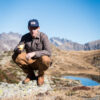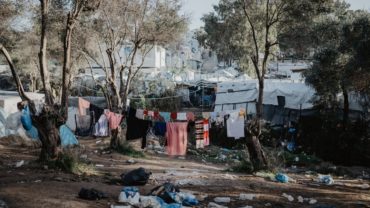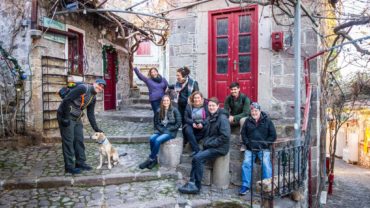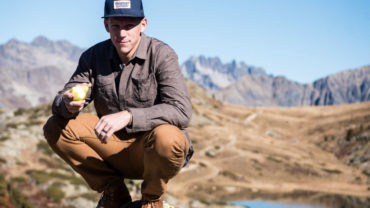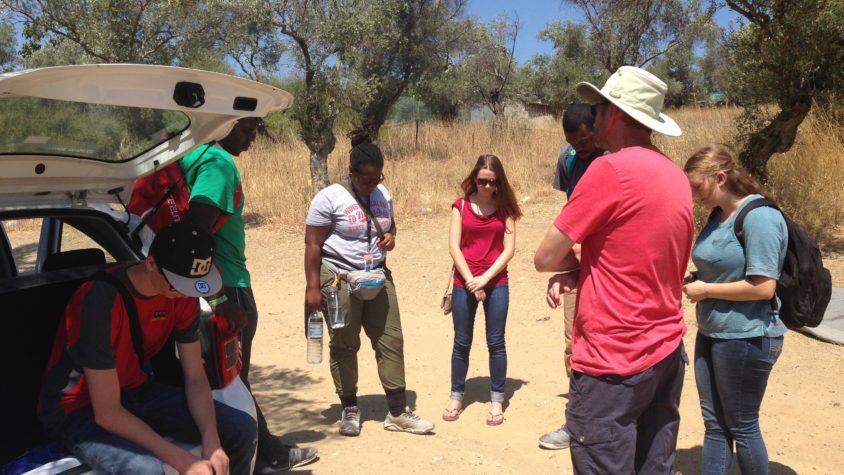
You’ve seen them in the movies; the discovery of an alternate reality or another dimension, or some kind of time travel that causes a strange shift in the world as we know it. A shift for the worse.
Our family experienced this firsthand. We traveled to a place that was very similar to one of these dystopian realities. A place where wealth doesn’t determine your lot in life. A place where sharing a room with a dozen other people crammed wall to wall is the norm, even if it was designed for only 6 people. A place where eating nothing but rice, cheese, and beans prepared in various ways twice a day is considered nutritious. And a place where one liter of water per person on a day topping out around 95-100 ˚F (35-38 ˚C) is “enough”. A dangerous place where riots and fires can and do happen at any time due to the high tensions of so many people in such a small place. A place that is surrounded and divided by high fences with razor wires. A place that cannot be completely comprehended until you are standing in the middle of it.
This alternate reality was at the refugee camp on Lesvos Island in Greece. And this reality is duplicated in dozens, if not hundreds, of other locations around the world. Our family and a small team from Mercy Hill Church in Greensboro, NC spent two-weeks working in the refugee camp in July. The Greek government relies on a private volunteer organization, who schedules 25+ volunteers a day, to keep the camp running and organized. It is a job that seems should be done by the Greek or EU government. We did things like general repairs, tent building, food distribution, gate monitoring, garbage collecting, housing coordination, census taking, guiding or carrying people to the doctor, and pretty much anything else that was needed. We also had the opportunity to talk to the people in the camp – hear about their struggles to leave their war torn countries; with the hopes of a better and safer life for their family. We also shared our own stories – and the hope that we’ve found in Jesus.
The people coming to camp are from all over the Middle East, Africa, and beyond. The last unofficial count in May was that over 40 countries were represented by immigrants in the camp. They come by boat illegally from Turkey, sent across by smugglers who charge around $1000 per person. The people from Syria are clearly the ones that are being granted asylum and “refugee” status quicker than anyone else, which is due to their ongoing civil war that has no clear or easy solution. The Syrians coming now are more and more women, children, and families as opposed to the prior influx of mainly single men. They arrive in shock, are taken to a temporary camp, which is near where their boat hits the beach, for dry clothes and food and water, and then are taken by bus to the main camp. There they are put into a large tent that holds up to 100 people in bunks for a day or two in order to be processed and seen by a doctor. After that, the volunteer organization, EuroRelief, helps get them into housing where they’re added to already full iso-boxes (like shipping containers with doors and windows) or tents. They’re given a sleeping bag, mat, a blanket, a bag of hygiene items and a set of clothes to get them started.
From there it is a long process of waiting and hoping, and more waiting. Each immigrant individual or family group has an interview to determine if they qualify for asylum. This process for some can take months. And for many, they are rejected and told that they have to go back to their home country. This is especially true for some of the African countries that are considered “safe,” and it has been the cause of some of the riots: the apparent inequality in how people from different countries are treated. And it is true – some nationalities are given higher priority. But how else could it be done when there are such differences in why people are trying to immigrate to Europe? There really appears to be no perfect answer, or way to handle the situation. Nonetheless, we were not there to provide answers, only to provide immediate love and support for people who have had their worlds turned upside down in a very short period.
What we saw in this alternate reality is that our daily struggles, our concerns for well-being, health, and security are nothing in comparison to the daily lives of these people. It was a hard place to be. Just seeing the difficulty and despair and comparing that to our personal lives was overwhelming. However, we also witnessed great joy and happiness. We saw kids laughing and playing in relative safety. We observed mothers who were so thankful to be off a dangerous boat, escaping untold dangers, and who were just happy to have a place to sleep with their children. Toward the end of our time there, we got to see a mother and two children, who had been hospitalized with scabies earlier in the week, move past their first major hurdle as they were transported to Athens to continue their journey to their hopeful destination in Sweden. We experienced something that was dangerous, beautiful, ugly, hard, and joyful all at the same time. Why? Because we believe that God called us to be at that place at that specific time. It wasn’t because we are special and more empathetic than other people. We did it out of obedience and love. Because we can see the love that God has for us – and it is enough for us to share with others.
